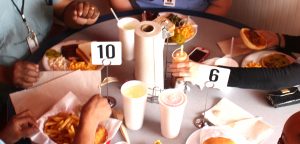By Kim Hilsenbeck
A peek at Greg Devonshire’s daily log might look a little like this:
• Wake up at 4 a.m.
• Run two hours
• Spend time with wife and an almost-two-year-old
• Head to work to serve up bar-b-que all day long
• Go home
• Spend more time with wife and an almost-two-year-old
• Sleep
• Do it all over again
Devonshire, 33, is a co-owner of Milt’s Pit BBQ in Kyle. Since September, he’s been training several hours a week to compete in an Ironman Triathlon on May 16.
With a wife, a business he bought just a year ago, a small child and one on the way, Devonshire said if he’s going to do an Ironman, “This is the time to do it.”
Why an Ironman triathlon?
“It’s something I’ve always wanted to do,” he said.
Some friends of his competed in Ironmans in recent years; Devonshire did two half marathons in the past two years, one in Lake Conroe, the other in Kerrville. The last one he did for Team COCI (Cherish Our Children International) to raise money.
“That’s why I started doing races, to raise money or awareness,” he said.
But he decided against doing that for this upcoming Ironman competition.
“I wanted to make sure I could actually make the race,” he said.
Will he make it to the start line?
Yes, he believes he will. And though he wishes he had a little more time to train, he’s basically ready.
“It’s pretty amazing what the body can do with proper training,” he said. “I like pushing myself to do things I didn’t think I could do.”
This year’s Ironman race is in The Woodlands near Houston.
“They say it’s one of the hardest Ironman’s there is, and it’s all because of the heat and humidity,” Devonshire said. “There’s very little shade.”
During the competition, Devonshire and roughly 2,000 others will swim 2.4 miles, then bike 112 miles and then run a marathon, which is 26.2 miles. He’ll have 17 hours to finish. He said most professional athletes complete the course in about nine hours or less.
But Devonshire is estimating it will take him longer.
“I’m hoping to finish in 13-14 hours,” he said. “There are a lot of variables — training/conditioning, nutrition, weather.”
Devonshire has been putting in his time in the water, on a bike and on the road. He works with a training coach, Brett Blankner, out of College Station. He said a coach was necessary for this kind of race.
“I needed somebody who could help me reach my goal,” he said. “He’s got the longest running podcast for training.”
Using an app called Training Peaks, Blankner creates a workout plan that Devonshire follows.
He runs around the neighborhood and swims at Five Mile Dam, the Comal River or the San Marcos River. He’s also gone to a private quarry in Austin.
But this might be Devonshire’s only Ironman race, as these kind of races put a strain on everyone in the family.
“It’s a sacrifice for everybody,” Devonshire said.
In recent weeks, he put in anywhere from 13 to 19 hours of training. Earlier in his regiment, he put in about 4-5 hours a week, but the training has stepped up as the race nears.
Devonshire gave kudos to his wife for allowing him the opportunity to tackle this challenge.
“There is no way I could do it without her,” Devonshire said. “It’s almost a selfish sport. But I try to do workouts either early or late; I try not to take that time away from the family.”
What about his diet — is he eating less BBQ these days?
“No, more,” he said.
Tall and slender, normally weighing in around 180 pounds, Devonshire is down to about 167 pounds. He said he can burn anywhere from 600 to 3,000 calories in a workout.
“I can’t keep the weight on with all the training,” he said.
Participants in the race can’t have any outside assistance during the race – no headphones, no cell phones. And entering can be pricey; Devonshire said the May 16 race fee was $650.
The winner can earn $500,000, though most likely it would be a professional athlete who wins.
What would Devonshire do if he won this Ironman race?
“I don’t know. I’d probably sleep because I would be really sore.”











